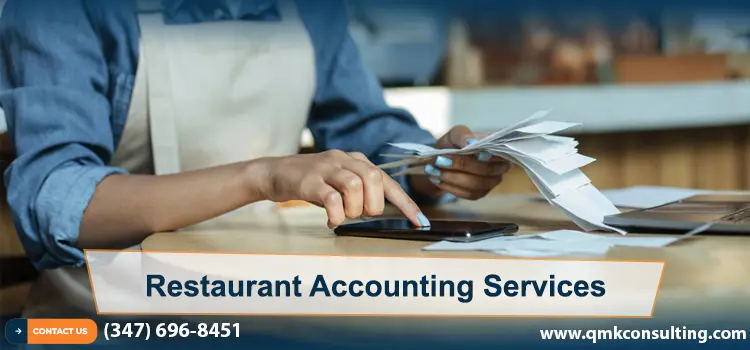
August 21, 2024 |Accounting & Bookkeeping


Running a successful restaurant is more than just serving delicious food, it's about maintaining a healthy bottom line. Whether you're a small café or a high-end dining establishment, the financial aspect of your business is very important.
This is where restaurant accounting comes into play. Understanding restaurant accounting and how it works can be the key to managing your finances effectively and ensuring your business thrives.
In this blog, we'll walk you through the essentials of restaurant accounting, the best tools to use, and how QMK Consulting can simplify this vital aspect of your business.
Restaurant accounting involves tracking and managing the financial aspects of your restaurant, from sales and expenses to payroll and taxes. Unlike general business accounting, restaurant accounting has unique elements, such as inventory management, menu pricing, and customer relationship management (CRM).
By focusing on these specifics, restaurant accounting provides a clear picture of your financial health, helping you make informed decisions that can enhance profitability and streamline operations.
Let’s say you run a mid-size restaurant, and you’ve noticed your profits fluctuating month to month but you can’t pinpoint the reason. With proper restaurant accounting, you’d be able to analyze your food costs, labor expenses, and sales data to identify inefficiencies.
This insight can help you adjust your menu prices, cut unnecessary costs, or even schedule staff more effectively, ensuring consistent profitability.
Now that you understand the importance of restaurant accounting, let's dive into how you can manage it effectively. While it may seem complicated, breaking it down into key steps can make the process manageable and even intuitive.
Start by establishing a solid accounting foundation. This involves creating a bookkeeping system where all your financial transactions are recorded. It's the first step towards gaining control over your finances.
Invest in restaurant-specific accounting software. This tool will automate many aspects of your accounting, from tracking expenses to generating reports, saving you time and reducing errors.
A chart of accounts is a list of all financial accounts in your restaurant's general ledger. It’s essential for organizing your transactions into categories like assets, liabilities, revenue, and expenses.
A Point of Sale (POS) system isn't just for processing payments. Integrated with your accounting software, it can track sales, manage inventory, and provide valuable data on customer preferences.
Accurate payroll tracking is crucial, especially in the restaurant industry where labor costs are a significant expense. Ensure you account for all employee wages, tips, and taxes.
Monitor your daily sales closely. This data not only shows you how much revenue you’re generating but also provides insights into peak times, popular menu items, and overall performance.
Prime costs, which include the cost of goods sold (COGS) and labor costs, are the most significant expenses in a restaurant. Keeping these in check is essential for maintaining profitability.
Choosing the right accounting software is crucial for managing your restaurant's finances efficiently. Here are some of the best options available:
● QuickBooks: A versatile tool with specialized features for restaurants, QuickBooks offers inventory management, sales tracking, and payroll processing.
● Xero: Known for its user-friendly interface, Xero integrates seamlessly with POS systems, making it easy to manage sales and expenses.
● Sage Intacct: This powerful software is ideal for larger restaurants that need detailed financial reporting and scalability.
● FreshBooks: FreshBooks is excellent for small to medium-sized restaurants looking for straightforward invoicing and expense tracking.
● Zoho Books: An affordable option that offers a range of features including inventory management and sales reporting, perfect for growing businesses.
● Wave: Ideal for startups and small restaurants, Wave offers free accounting software with basic but essential features.
● M3: Designed specifically for the hospitality industry, M3 provides comprehensive accounting solutions tailored to restaurants.
At QMK Consulting, we understand the unique challenges of restaurant accounting. Our team of experts offers tailored solutions that align with your specific needs, ensuring your financial management is both efficient and compliant with all regulations. We provide: ● Comprehensive accounting services: From setting up your books to managing payroll and preparing tax returns, we handle it all, allowing you to focus on the real deal, which is running your restaurant.
● Cost-effective solutions: We offer competitive pricing without compromising on quality, ensuring you get the best value for your money.
● Timely service: We understand that timing is crucial in the restaurant industry. Our team is committed to meeting deadlines, ensuring that your financial records are always up to date.
● Regulatory compliance: With our deep knowledge of tax laws and industry regulations, we ensure that your restaurant remains compliant, avoiding costly penalties and audits.
Are you ready to take charge of your restaurant business's financial health without having to stress yourself on the complexities and break the bank?
QMK is the best fit for you,
Restaurants typically use either cash or accrual accounting. Cash accounting is simpler and involves recording transactions when cash changes hands, while accrual accounting records transactions when they are incurred, providing a more accurate financial picture.
A restaurant accountant manages financial records, tracks expenses, prepares financial reports, handles payroll, ensures tax compliance, and provides insights that help improve profitability. They play a crucial role in the financial health of the restaurant.